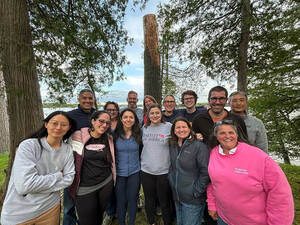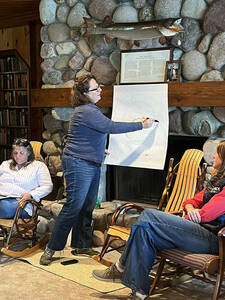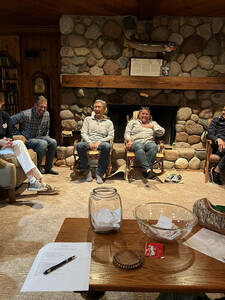Annual Zahm Retreat Fuels Discussion, Reflection, and Response to Education in the Era of Artificial Intelligence
The use of generative artificial intelligence is becoming increasingly pervasive in higher education—in the classroom, in research, and in day-to-day operations. Notre Dame’s faculty, students, and staff need to become adept but critical users of these powerful new AI tools, engaging actively and thoughtfully with their ethical complexities.

The new Institute for Ethics and the Common Good (formerly known as the Institute for Advanced Study) took a deep dive into this topic in late May through “Education in the Era of Artificial Intelligence,” the Institute’s fourth annual Zahm Retreat. Named after Rev. John A. Zahm, C.S.C. (1851-1921), an influential faculty member and administrator who bolstered Notre Dame’s research reputation and worked to bridge the divide between the sciences and religion, the Zahm Retreat brings together faculty and administrators from various disciplines and perspectives to engage with a current, ethically complex issue facing higher education through the lens of the University’s Catholic mission. This year’s three-day experience at the Notre Dame Retreat and Research Center in Land O’ Lakes, Wisconsin, created space for 15 faculty, administrators, and community partners to discuss, reflect on, and respond to ethical issues around the use of AI in higher education.
“In times of rapid change and uncertainty, Notre Dame’s greatest strength is its Catholic mission. It offers us insight into our most fundamental values and serves as a source of inspiration and hope,” says Meghan Sullivan, Director of the Institute for Ethics and the Common Good and Wilsey Family College Professor of Philosophy.
“When it comes to imagining ND in the era of AI, the group had in-depth discussions about what it looks like to use emerging technologies to enhance and protect the inherent dignity of our students and colleagues. We educated one another about areas in which we think ND might have an important institutional voice on technological development—fields like policy, ethics, and human computer interaction. Most importantly, being on retreat together we deepened relationships among key voices across campus, relationships that enable us to truly “think like a university” on a very complex issue,” Sullivan says.

The first day of the retreat included focused discussion on Notre Dame’s current relationship to technology within the context of University mission and Catholic Social Tradition. On the following day, the group explored emerging trends in AI that have the potential to significantly impact teaching, learning, and research. The third day was dedicated to formulating next steps, as participants worked together on new proposals and initiatives to help Notre Dame cultivate a relationship with technology that fosters mental, spiritual, communal, and physical well-being.
“The Zahm Retreat brought together a wide array of campus perspectives around AI,” says Jane Livingston, Notre Dame’s Vice President for Information Technology and Chief Information Officer, who attended the retreat.

“Especially helpful to me were the conversations on the ‘future of work’—both in regard to our work at Notre Dame and also about our mission to prepare students as whole people (mind, body, spirit), ready to contribute as thoughtful citizens and members of society after graduation. My time with such an engaged, enthusiastic, and interdisciplinary group left me confident that Notre Dame is well prepared as new technologies like AI challenge us to think differently about the ways we conduct research, teach, and manage the business of higher education,” Livingston says.
Ron Metoyer, Vice President and Associate Provost for Teaching and Learning, was also part of the retreat.
"The opportunity to sit with colleagues from all over campus, representing a wide variety of experiences and perspectives when it comes to generative AI, was incredibly enlightening for me," says Metoyer. "These conversations reinforced just how important it is to acknowledge both what has people excited and what makes them concerned as the University moves forward in how we respond to this technology. Together with our team at Notre Dame Learning, I’m excited to work closely with academic leadership and our excellent faculty to develop discipline-specific approaches to AI in teaching and learning.”
Topics addressed at past Zahm Retreats have included the role of universities in finding solutions to the climate crisis, guided by Laudato Si’; Fratelli Tutti and the ways the Church engages with civil society, the law, migration, and criminal justice reform; and Notre Dame’s work to create a diverse and inclusive University community.
The Institute for Ethics and Common Good is at the heart of the Ethics Initiative, a University-wide effort to establish Notre Dame as a premier global destination for the study of ethics. Under the leadership of Meghan Sullivan, Ethics Initiative director and Wilsey Family College Professor of Philosophy, the Institute focuses on cross-disciplinary ethics research, undergraduate course development, the moral formation of its students and faculty, and engaging the public in meaningful dialogue around ethical issues. Shaped by the powerful and enduring contributions of the Catholic philosophical tradition, the Institute draws support from its complimentary roots of faith and reason.